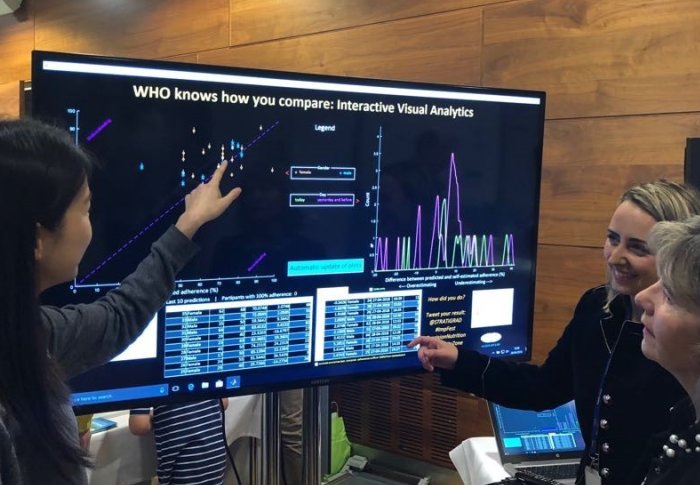Do you know how healthy your diet is?

Isabel Garcia-Perez and Joram Posma share their experiences of engaging the public on their dietary habits at the Imperial Festival.
Our engagement activity titled “Urine for Personalised Nutrition” focussed on introducing the World Health Organization dietary recommendations to the public through our “WHO Restaurant” stand, led by Professor Gary Frost and his team of dieticians. Participants were asked to fill in a questionnaire about their dietary habits and were then encouraged to estimate their percentage of adherence to the WHO Dietary recommendations.
What's hidden in your urine?
Participants then progressed to the “The Secrets Hidden in Your Urine” stand, where we explained how urine composition and metabolic profiles can be used to objectively assess dietary habits. For this we used our model where we analysed differences in the metabolic profile of participants following four diets with different levels of adherence to WHO guidelines in a controlled clinical trial (Garcia-Perez and Posma, et al. (2017) The Lancet Diabetes & Endocrinology 5(3)).
 Finally, participants were invited to see what their urinary metabolic profile would look like based on their dietary habits. Dr Joram Posma showcased the software he’d developed that simulates a urinary metabolic profile based on accurate data of metabolite excretion from the controlled clinical trial model, using the dietary profile data the participants provided. The software then went on to predict the level of adherence based on the model using the simulated urine spectrum. It visualised the self-estimation, model prediction and difference between those two of each person, in an interactive display that showed how their data fits with the data from all the participants attending the festival.
Finally, participants were invited to see what their urinary metabolic profile would look like based on their dietary habits. Dr Joram Posma showcased the software he’d developed that simulates a urinary metabolic profile based on accurate data of metabolite excretion from the controlled clinical trial model, using the dietary profile data the participants provided. The software then went on to predict the level of adherence based on the model using the simulated urine spectrum. It visualised the self-estimation, model prediction and difference between those two of each person, in an interactive display that showed how their data fits with the data from all the participants attending the festival.
Beliefs vs predictions on healthy diets
Over the two days of the festival the team was able to collect data from almost 400 participants, which resulted in showing that there are significant differences between how much people believe their diet adheres to WHO guidelines and how much it is predicted to do so, with people both underestimating and overestimating. A total of 5 people fully adhered to 100% of the guidelines, but none of these actually estimated they did so. This shows that different strategies can be useful to educate the general public about how healthy their diet actually is.
Article supporters
Article text (excluding photos or graphics) © Imperial College London.
Photos and graphics subject to third party copyright used with permission or © Imperial College London.
Reporter
Isabel Garcia Perez
Department of Metabolism, Digestion and Reproduction
Dr Joram M. Posma PhD MSc B AS MRSC
Department of Metabolism, Digestion and Reproduction